Traffic jams have fallen dramatically in the Brussels-Capital Region in recent years as a result of many companies' adoption of a hybrid working model for their employees, l'Echo has reported.
According to a recent study by Coyote, a Belgian tech company specialising in road safety, traffic congestion in Brussels fell 23% between November 2019 and 2022, while for Belgium as a whole it dropped 15%. (Brussels Mobility, the capital's official transport office, recorded a similar decrease of 26% in traffic congestion in the capital over the same period.)
Coyote noted that the decline is notable even if one takes into account the fact that the average annual distance travelled by Belgian cars has fallen 5% since before the Covid-19 pandemic. According to Director General Vincent Hebert, the discrepancy in the reduction in traffic congestion between Brussels and the rest of Belgium is largely (although not exclusively) due to the fact that jobs in the capital are far more amenable to a hybrid working model.
"In Brussels, this change is more marked because the city is home to a number of head offices and administrations," Hebert explained. "Therefore, this phenomenon of traffic decline is more accentuated, especially since it is easier to use public transport within the city than in the Ardennes, for example."
Morning and evening jams
According to another report recently published by Vias, the Belgian Road Safety Institute, there is also a marked disparity in traffic congestion in Brussels between the morning and evening rush hours.
In particular, Vias noted that traffic jams during the morning rush hour have decreased significantly, with for example the journey between Namur and Brussels, which took 71 minutes in 2019, now taking a mere 60 minutes — a decline of 15%.
However, congestion has risen considerably during the evening rush hour, with journey times from Brussels to Genk, Ghent, Tournai, and many other cities all experiencing marked increases since 2019. Thus, for instance, an evening trip from Brussels to Mons, which typically took little more than 68 minutes at the beginning of 2020, now takes 75 minutes — an increase of 10%.
Related News
- 'Road safety is not always easy': Brussels must stick with Good Move plan
- Belgium in Brief: Blocking Brussels
Vias spokesman Benoit Godart explained that this divergence between morning and evening congestion is also principally a consequence of the hybrid working model implemented by many Belgian companies since the pandemic.
"More and more people are shifting their departure in the morning according to traffic, which shortens their journey to work," Godart explained. "In the evening, this is not the case as people often have family obligations — so travel times are therefore as long, or even longer, than before the pandemic."

